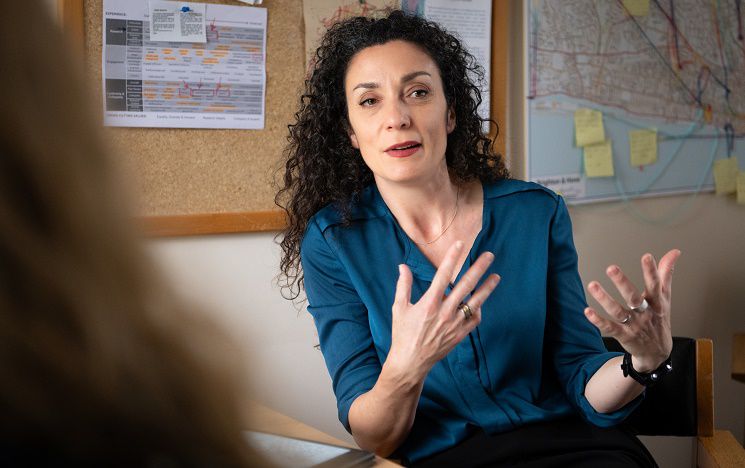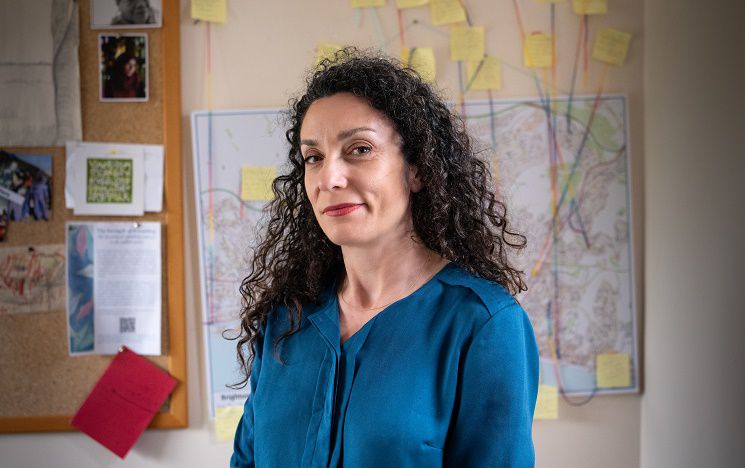Improving understanding of migrant experiences
Our world is shaped by the movement of people between nations and cultures. As a member of the Sussex Centre for Migration Research (SCMR), Dr Sarah Scuzzarello’s work helps us to better understand why people choose to leave their home countries, and how they navigate identities and communities in new lands.
Introducing...
As Senior Lecturer in Geography and International Development, Dr Sarah Scuzzarello has been exploring issues of migration and identity at Sussex since 2017. Her most recent work with the Sussex Centre for Migration Research has considered the influence of issues of gender and sexuality on migrant experiences, and has spanned from projects in Thailand to local collaborations in Brighton.
We caught up with Sarah to discuss how her own experiences of migration have influenced her career, along with the importance of navigating research with curiosity and an open heart.
What sparked your initial interest in migration, and how has that evolved over time?
Migration has always been a significant theme in my life. My father was in the military, so our family moved every few years. My maternal grandfather is Swedish and settled in Italy as a foreign correspondent, while my brother and I both left Italy to pursue our studies in Sweden aged 19.
Migration has always felt very normal to us, but it’s actually quite rare: just over 3% of the world’s population migrates internationally, and perhaps even less decide to stay.
As I became more interested in social dynamics, I wanted to further explore migration - partly to put my own experiences in a broader context, but also to consider what drives other people to move, and what happens to them when they settle.
How have wider influences helped to shape your area of specialism?
My early career focused on policy development, but I felt something was missing. I soon realised that politics and personal experiences of migration are so closely connected, you can’t consider them in isolation. You can’t fully understand a nation state without considering its influence on people, or people without the context of the nation state they live in.
There’s also so much we can learn from each other about mobility – not only discrimination and assimilation, but powerful defiance.” Dr Sarah Scuzzarello
Senior Lecturer for the Departments of Geography and International Development
There’s a tendency to victimise migrants, but those who leave their home countries aren’t weak people, and they have many stories of resistance.
What initially drew you to Sussex, and why have you continued to conduct your research here?
I’m an interdisciplinary scholar. While my PhD is in social sciences, my major is in politics, so I’d define my work more as political sociology. I’m a bit of an oddball, but I make sense within the Sussex culture. My colleagues work in similar ways, so it’s nice to feel like I'm not alone!
Sussex also has external links that help me to develop professionally. I lead the communications side of the Sussex Centre for Migration Research, and I’m part of the International Migration Research Network, IMISCOE. I’m also Associate Editor of the Journal of Ethnic and Migration Studies (JEMS), which is a great way to keep up with cutting-edge developments.
How has your research focus developed throughout your time at Sussex?
The Sussex-Mahidol Migration Partnership (SMMP) opened up unexpected opportunities for me. I’d previously worked on ‘underprivileged’ experiences of migration, but conducting research in Thailand enabled me to consider how white Western migrants navigate very different dynamics.
I interviewed a range of different people, including elderly British people who’d moved at a time when homosexuality was criminalised back home. Migrating, they told me, had allowed them to embrace their identities. When Covid struck, I began reflecting on those interviews, and it became clear that we were missing out on an area of insight, which prompted my current research on LGBTQ+ migrants.
Colleagues such as Nuno Ferreira have already done fantastic work around people seeking asylum on the basis of sexual orientation and gender identity. It felt like there was a gap in our understanding around LGBTQ+ migrants who move for other reasons, such as for work or study, so much of my current research explores how those groups navigate different forms of privilege and prejudice.

How do you communicate your research to audiences beyond academia?
I’m increasingly interested in engaging with broader audiences. Books, papers and conferences enable me to share findings within the academic community, but the public aren’t going to read 9,000-word articles – even if they’re open access!
My students inspire me to share work in different ways. Recently, one student explored how migrants in vulnerable and precarious positions care for each other beyond support received from the State. She curated an exhibition of photographs co-created with project participants, which helped audiences engage in a completely different way.
This influenced my collaboration with Creative Director, Gil Mualem-Doron, who happens to be a queer migrant. He suggested alternative approaches to expressing my research, so we decided to host creative workshops with local LGBTQ+ migrants in order to explore their experiences, which culminated in an exhibition at The Ledward Centre last autumn.
There were collages where participants could add thoughts on the UK and their home countries, and a shed designed to represent the complex concept of ‘home’. They shared thoughts on where they felt most welcome, and obstacles they’d faced in the UK.
The exhibition garnered a lot of attention – a selection of its work will be showcased at the University Library later this year, and we’ve also published an accompanying zine. I’d like to continue exploring similar participatory, experiential approaches in future.
It sounds like the project organically developed by utilising new approaches. Did it evolve in any other surprising ways?
Having more in-depth engagement with project participants over a longer period has helped me to understand research impact in a new way. For example, someone explained that the project prompted them to re-frame their experiences:
“People always ask me where I come from,” they said. “But never why I’m here.”
Another participant explained that as a gay man, he’d always felt two steps behind society; as a gay migrant, he felt 10 steps behind. A colleague often picked him up for work from the house he shared with his husband, who he’d refer to as his housemate – not because he was ashamed, but because he felt he was already fighting against so many stereotypes. Participating in the project encouraged him to express his full identity.
Impact doesn’t always equate to policy change – validating people’s experiences feels equally important.
What advice would you give to those who may be interested in pursuing a career in research?
Three things:
- Be curious and humble. Approach fieldwork with open eyes and an open heart, and try to understand what people are really trying to say, even if you disagree.
- Focus on disseminating your research – you may be doing fantastic work, but if it isn’t out in the world, it won’t be seen.
- Largely, you’ll build your own career by deciding what to specialise in, what you want to invest your time in, who you want to connect with – it's important to seek out opportunities that resonate with you.
